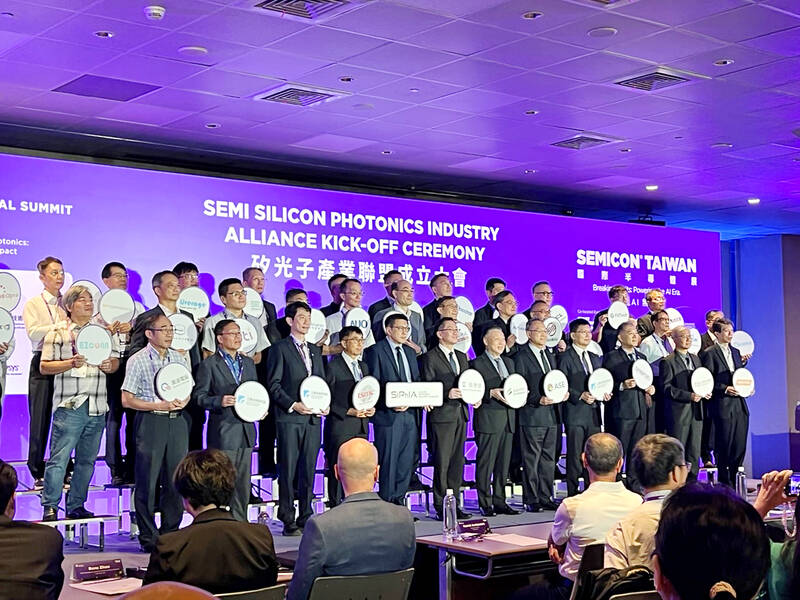Thirty Taiwanese firms, led by Taiwan Semiconductor Manufacturing Co (TSMC, 台積電) and ASE Technology Holding Co (日月光投控), yesterday launched a silicon photonics industry alliance, aiming to accelerate the medium’s development and address the energy efficiency of artificial intelligence (AI) devices like data centers.
As the world is ushering in a new AI era with tremendous demand for computing power and algorithms, energy consumption is emerging as a critical issue, TSMC vice president of integrated interconnect and packaging business C.K. Hsu (徐國晉) told a media briefing in Taipei.
To solve this issue, it is essential to introduce silicon photonics and copackaged optics (CPO) technology to manufacture chips used in data centers and AI devices, Hsu said.

Photo: Grace Hung, Taipei Times
The Silicon Photonics Industry Alliance aims to shape a global standard for the technology, which still lacks consensus on design, manufacturing and testing, through collaboration with companies in the supply chains, Hsu said.
As Taiwan has built a solid foundation in chip manufacturing, it has a good chance to become an important base for the global AI industry if silicon photonics technology takes root here, he said.
TSMC, the world’s biggest contract chipmaker, expects the world’s silicon photonics market to expand at an annual compound growth rate of 40 percent to US$64 million by 2028, Hsu said during his keynote speech.
Together with CPO technology, the market would be worth about US$500 million in 2028, the chipmaker forecast.
The growth would be driven by rising demand for high data rate optical transceiver modules used in AI servers, Hsu said.
Taiwan has been developing silicon photonics technology over the past few years, but high costs have curbed the growth of shipments, ASE chief operating officer Tien Wu (吳田玉) said.
Because of surging demand for AI devices, silicon photonics technology development has picked up in recent years, paving the way for quicker commercialization of the technology, Wu said.
The alliance also includes Hon Hai Precision Industry Co (鴻海精密), MediaTek Inc (聯發科), Quanta Computer Inc (廣達) and AUO Corp (友達), as well as the Industrial Technology Research Institute.
Separately, the Interuniversity Microelectronics Center (IMEC), one of the world’s leading independent nanoelectronics research-and-development (R&D) hubs, yesterday said it has built longstanding partnerships with Taiwanese chipmakers such as TSMC, United Microelectronics Corp (聯電) and Vanguard International Semiconductor Corp (世界先進) to facilitate advanced technologies, CEO Luc Van den Hove said in Taipei.
The Belgian research institute also collaborates with Taiwan’s top universities, such as National Taiwan University and National Tsing Hua University, on R&D.
The institute focuses on developing cutting-edge technologies and driving the roadmaps of most advanced process technologies that are three or four generations ahead of manufacturing, or six to 10 years ahead of manufacturing, he said.
IMEC specializes in lithography technology and has built close partnerships with ASML Holding NV, he said.
“Taiwan is a very important region for us,” he said.
IMEC has been collaborating with TSMC for 20 years on developing advanced technologies, he said.
Commenting on TSMC’s decision to build a new plant in Dresden, Germany, he said it is a “very wise strategy” as it is important for TSMC to reach out to some of its customers.

The Ministry of the Interior (MOI) is to tighten rules for candidates running for public office, requiring them to declare that they do not hold a Chinese household registration or passport, and that they possess no other foreign citizenship. The requirement was set out in a draft amendment to the Enforcement Rules of the Public Officials Election and Recall Act (公職人員選舉罷免法 ) released by the ministry on Thursday. Under the proposal, candidates would need to make the declaration when submitting their registration forms, which would be published in the official election bulletin. The move follows the removal of several elected officials who were

The Republic of China (ROC) is celebrating its 114th Double Ten National Day today, featuring military parades and a variety of performances and speeches in front of the Presidential Office in Taipei. The Taiwan Taiko Association opened the celebrations with a 100-drummer performance, including young percussionists. As per tradition, an air force Mirage 2000 fighter jet flew over the Presidential Office as a part of the performance. The Honor Guards of the ROC and its marching band also heralded in a military parade. Students from Taichung's Shin Min High School then followed with a colorful performance using floral imagery to represent Taiwan's alternate name

FOUR DESIGNATED AREAS: Notices were issued for live-fire exercises in waters south and northwest of Penghu, northeast of Keelung and west of Kaohsiung, they said The military is planning three major annual exercises across the army, navy and air force this month, with the navy’s “Hai Chiang” (海強, “Sea Strong”) drills running from today through Thursday, the Ministry of National Defense said yesterday. The Hai Chiang exercise, which is to take place in waters surrounding Taiwan, would feature P-3C Orion maritime patrol aircraft and S-70C anti-submarine helicopters, the ministry said, adding that the drills aim to bolster the nation’s offshore defensive capabilities. China has intensified military and psychological pressure against Taiwan, repeatedly sending warplanes and vessels into areas near the nation’s air defense identification zone and across

A Chinese takeover of Taiwan would severely threaten the national security of the US, Japan, the Philippines and other nations, while global economic losses could reach US$10 trillion, National Security Council Deputy Secretary-General Lin Fei-fan (林飛帆) wrote in an article published yesterday in Foreign Affairs. “The future of Taiwan is not merely a regional concern; it is a test of whether the international order can withstand the pressure of authoritarian expansionism,” Lin wrote in the article titled “Taiwan’s Plan for Peace Through Strength — How Investments in Resilience Can Deter Beijing.” Chinese President Xi Jinping’s (習近平) intent to take Taiwan by force